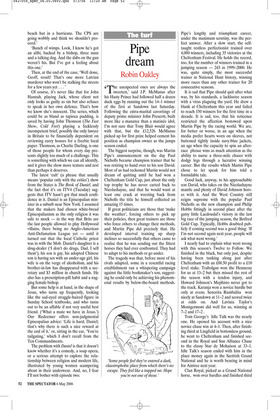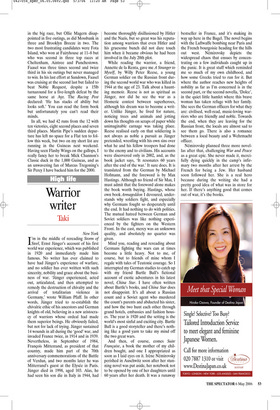Pipe dream
Robin Oakley
‘The unexpected ones are always the sweetest,’ said J.P. McManus after his Hasty Prince had followed half a dozen duck eggs by running out the 14–1 winner of the first at Sandown last Saturday. Following the extra-marital cavortings of deputy prime minister John Prescott, built more like a manatee than a matinée idol, I’m not sure that Tony Blair would agree with that, but the £12,526 McManus picked up for first prize helped cement his position as champion owner as the jumps season ended.
The biggest surprise, though, was Martin Pipe’s announcement on the day Paul Nicholls became champion trainer that he was retiring to hand over to his son David. Most of us had reckoned Martin would not dream of quitting until he had won a Cheltenham Gold Cup, just about the only top trophy he has never carted back to Nicolashayne, and that he would want at least one crack at wresting back from Nicholls the title he himself collected an amazing 15 times.
If great politicians are those that ‘make the weather’, forcing others to pick up their policies, then great trainers are those who force others to change their methods, and Martin Pipe did precisely that. He developed interval training up sharp inclines so successfully that others came to realise that he was sending out the fittest horses they had ever confronted. They had to adapt to his methods or go under.
The tragedy was that, before most of his rivals adapted, some in a resentful racing establishment ran a whispering campaign against the little bookmaker’s son, suggesting he could only be achieving his phenomenal results by below-the-board methods. Pipe’s lengthy and triumphant career, under the maximum scrutiny, was the perfect answer. After a slow start, the selftaught restless perfectionist trained over 4,000 winners, including 35 victories at the Cheltenham Festival. He holds the record, too, for the number of winners trained in a jumping season — 243 in 1999–2000. He was, quite simply, the most successful trainer in National Hunt history, winning more races than any other trainer for 20 consecutive seasons.
It is sad that Pipe should quit after what was, by his standards, a lacklustre season with a virus plaguing the yard. He drew a blank at Cheltenham this year and failed to reach 150 winners for the first time in a decade. It is sad, too, that his reticence restricted the affection bestowed upon Martin Pipe by the racing world. We are, for better or worse, in an age when the media prefer hearts worn on sleeves, not buttoned tightly inside navy-blue jackets, an age when the capacity to spin an afterrace phrase wins as much attention as the ability to nurse a three-mile chaser with dodgy legs through a lucrative winning career. But the results which Martin Pipe chose to let speak for him told a formidable tale.
Good luck, anyway, to his approachable son David, who takes on the Nicolashayne mantle and plenty of David Johnson horses with it. And the West Country still reigns supreme with the popular Paul Nicholls as the new champion and Philip Hobbs fittingly in second place after the gutsy little Lacdoudal’s victory in the last big race of the jumping season, the Betfred Gold Cup. Typically, Hobbs doubted publicly if coming second was a good thing: ‘If I’m not second again next year, people will ask what went wrong.’ I nearly had to explain what went wrong with this season’s Twelve to Follow. We finished in the black, but only just, despite having been tanking along just after Cheltenham with an £88.50 profit to a £10 level stake. Trabolgan won the Hennessy for us at 13–2 but then missed the rest of the season with a tendon injury, and Howard Johnson’s Mephisto never got to the track. Karanja won a novice hurdle but only at evens. Senorita Rumbalita won nicely at Sandown at 11–2 and scored twice at odds on. And Lavinia Taylor’s Montgermont did well for us, winning at 7–2 and 17–2 .
Tom George’s Idle Talk was the nearly one. He opened his account with a nice novice chase win at 4–1. Then, after finishing third at Lingfield in bottomless ground, he went to Cheltenham and finished second in the Royal and Sun Alliance Chase to the classy Star de Mohaison at 33–1. Idle Talk’s season ended with him in the place money again in the Scottish Grand National and he is worth bearing in mind for Aintree next year.
Clan Royal, picked as a Grand National horse, won over hurdles and finished third in the big race, but Ollie Magern disappointed in five outings, as did Mossbank in three and Brooklyn Breeze in two. The two most frustrating candidates were Fota Island, who won at Fairyhouse at 11–8 but who was second in three top races at Cheltenham, Aintree and Punchestown. Faasel was three times second and twice third in his six outings but never managed to win. In his last effort at Sandown, Faasel was cruising at the second last but failed to beat Noble Request, despite a 15lb turnaround for a five-length defeat by the same horse at Ayr. The Racing Post declared: ‘He has stacks of ability but looks soft.’ You can read the form book but unfortunately you can’t read their minds.
In all, we had 42 runs from the 12 with ten victories, eight second places and seven third places. Martin Pipe’s sudden departure has left no space for a Flat ten to follow this week, but two on my short list are running in the Guineas next weekend. Having seen Flashy Wings on the gallops, I really fancy her to break Mick Channon’s Classic duck in the 1,000 Guineas, and as an unwavering fan of Marcus Tregoning’s Sir Percy I have backed him for the 2000.















































 Previous page
Previous page